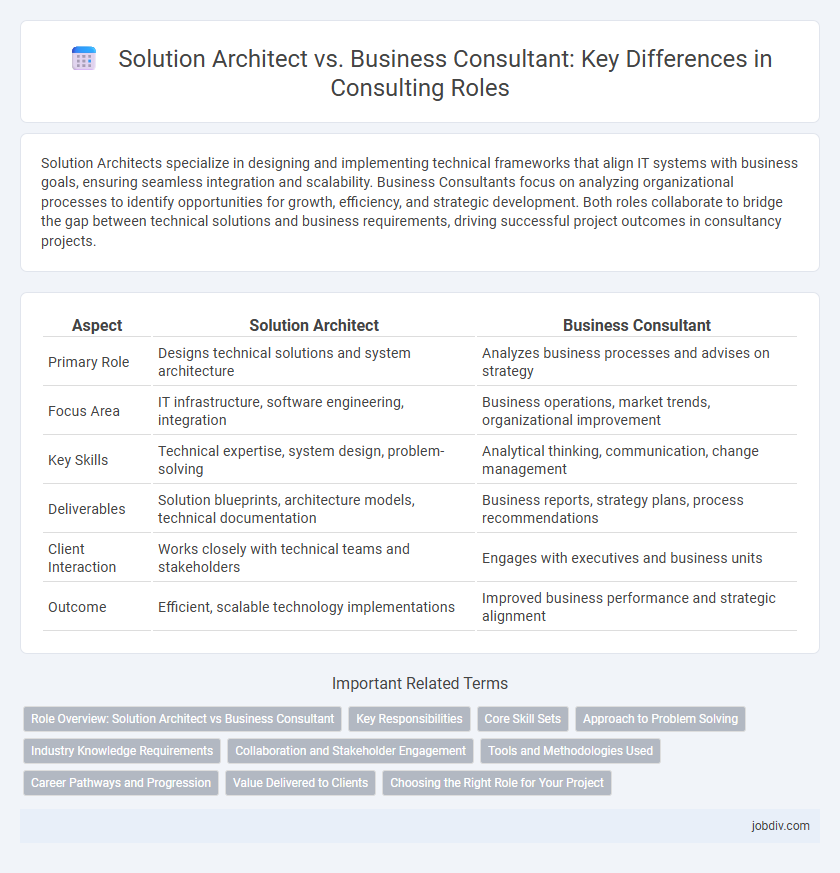Solution Architects specialize in designing and implementing technical frameworks that align IT systems with business goals, ensuring seamless integration and scalability. Business Consultants focus on analyzing organizational processes to identify opportunities for growth, efficiency, and strategic development. Both roles collaborate to bridge the gap between technical solutions and business requirements, driving successful project outcomes in consultancy projects.
Table of Comparison
| Aspect | Solution Architect | Business Consultant |
|---|---|---|
| Primary Role | Designs technical solutions and system architecture | Analyzes business processes and advises on strategy |
| Focus Area | IT infrastructure, software engineering, integration | Business operations, market trends, organizational improvement |
| Key Skills | Technical expertise, system design, problem-solving | Analytical thinking, communication, change management |
| Deliverables | Solution blueprints, architecture models, technical documentation | Business reports, strategy plans, process recommendations |
| Client Interaction | Works closely with technical teams and stakeholders | Engages with executives and business units |
| Outcome | Efficient, scalable technology implementations | Improved business performance and strategic alignment |
Role Overview: Solution Architect vs Business Consultant
Solution Architects design and implement technical solutions aligned with business goals, focusing on system architecture, software integration, and technology strategy. Business Consultants analyze organizational processes, identify improvement opportunities, and recommend strategic initiatives to enhance overall business performance. Their roles intersect in project delivery but differ in technical depth and business process expertise.
Key Responsibilities
Solution Architects design and implement technical frameworks that align with business goals, focusing on system integration, architecture, and technology solutions to meet client needs. Business Consultants analyze organizational processes, identify improvement opportunities, and develop strategic plans to enhance overall business performance and efficiency. Both roles require strong communication skills, but Solution Architects emphasize technical expertise while Business Consultants prioritize business strategy and process optimization.
Core Skill Sets
Solution Architects excel in technical design, system integration, and software architecture, leveraging expertise in cloud platforms, development frameworks, and infrastructure management. Business Consultants specialize in strategic analysis, process optimization, and stakeholder engagement, utilizing skills in market research, financial modeling, and change management. Both roles require strong problem-solving abilities, but Solution Architects prioritize technical implementation while Business Consultants focus on business strategy and operational improvement.
Approach to Problem Solving
Solution Architects utilize technical frameworks and design methodologies to create scalable, efficient IT solutions that align with organizational goals. Business Consultants analyze market trends, operational processes, and stakeholder needs to recommend strategic improvements that enhance business performance. Both roles emphasize problem-solving, yet Solution Architects prioritize system architecture optimization while Business Consultants focus on aligning business strategies with market demands.
Industry Knowledge Requirements
Solution Architects require deep technical expertise combined with industry-specific knowledge to design tailored IT solutions that align with business goals. Business Consultants focus on broader industry trends, market dynamics, and organizational challenges to recommend strategic initiatives that drive growth and efficiency. Both roles demand a solid understanding of industry regulations, competitive landscapes, and customer needs to ensure effective decision-making.
Collaboration and Stakeholder Engagement
Solution Architects and Business Consultants collaborate by aligning technical solutions with business goals, ensuring stakeholder requirements are accurately captured and addressed. Solution Architects translate complex business needs into scalable, cost-effective system designs, while Business Consultants facilitate communication between stakeholders to drive consensus and strategic alignment. Effective stakeholder engagement relies on their complementary roles to bridge gaps between technology teams and business units, maximizing project success and value delivery.
Tools and Methodologies Used
Solution Architects primarily utilize modeling tools like UML, architecture frameworks such as TOGAF, and cloud platforms including AWS or Azure for designing scalable IT solutions. Business Consultants rely on data analysis software like Tableau, process improvement methodologies such as Six Sigma or Lean, and stakeholder engagement techniques to optimize business performance. Both roles integrate project management tools like Jira or MS Project to ensure effective delivery and alignment with organizational goals.
Career Pathways and Progression
Solution Architects typically advance by deepening technical expertise and moving into roles such as Lead Architect or Chief Technology Officer, specializing in designing and implementing complex IT solutions. Business Consultants often progress by expanding strategic advisory skills and can evolve into Senior Consultant, Project Manager, or Management Consultant positions, focusing on business processes and organizational improvement. Both career pathways offer opportunities to transition into executive roles like Director of Consulting or Chief Innovation Officer, depending on industry experience and leadership capabilities.
Value Delivered to Clients
Solution Architects deliver value by designing scalable, technology-driven solutions tailored to clients' technical requirements, ensuring seamless integration and system efficiency. Business Consultants provide strategic insights and market analysis that optimize operational processes and drive business growth through informed decision-making. Both roles complement each other by aligning IT infrastructure with business objectives, maximizing overall client value.
Choosing the Right Role for Your Project
Selecting between a Solution Architect and a Business Consultant depends on the project's primary needs: technical design and implementation or strategic business analysis and change management. Solution Architects excel in creating detailed IT systems and infrastructure aligning with business goals, while Business Consultants focus on identifying organizational challenges and recommending process improvements. Understanding the scope and desired outcomes ensures the right expert drives project success and delivers maximum value.
Solution Architect vs Business Consultant Infographic

 jobdiv.com
jobdiv.com